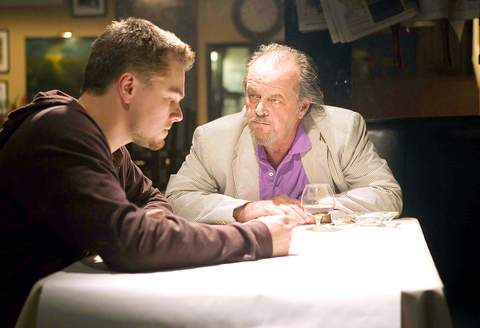In the past few years, it seems as if Martin Scorsese has been trying very hard to make films that can't readily be identified as, well, Martin Scorsese films. Gangs of New York and The Aviator are certainly good movies, but they lack the mugs, goombahs and made-men of such from-the-heart Scorsese classics as Mean Streets and GoodFellas.
The Departed is a Scorsese movie and proud of it. And that's part of what makes it so very good. That, and an excellent script penned by William Monahan and a dream cast headed by Leonardo DiCaprio, Matt Damon and Jack Nicholson.
A hugely successful 2002 Hong Kong thriller, Infernal Affairs, provides the blueprint that is essentially a tale of two moles. Or brother rats, if you like.

PHOTOS COURTESY OF LONG SHONG
One, Colin Sullivan (Damon), is deeply embedded in the Massachusetts State Police Department. The other, Billy Costigan (DiCaprio), has newly infiltrated the Irish mafia led by the savage and irrepressible Frank Costello (Nicholson).
In a scenario worthy of Dickens, Colin was recruited at a soda fountain as a kid by a suspiciously friendly Frank who took him under his wing like a surrogate father. He did so, we quickly learn, for the sole purpose of raising his own private rat — an insider who can tip him off whenever the cops are coming his way.
Billy, who also grew up in South Boston, was all but fated to become one of Frank's boyos. To change that was one reason he went into law enforcement. But as far as avuncular Captain Queenan (Martin Sheen) and his hard-nosed assistant, Sergeant Dignam (Mark Wahlberg, in a firecracker of a performance), are concerned, Billy's “tainted” background makes him the perfect choice to go undercover.

The kicker? Each is assigned to find the mole inside their respective group. Or, as Colin exults to his mentor, “Hey, Frank! I gotta find myself!”
Billy isn't quite as enthusiastic. Now that Frank and his lieutenant, French (Ray Winstone, solid), know there's an informer, they're liable to do anything. Begging Dignam to pull him off the job, he explodes, “Do you want him to chop me up and feed me to the poor?”
These two marvelous actors make the most of their contrasting characters — Damon's cock-of-the-walk smoothie versus DiCaprio's scared-stiff sacrificial lamb. It's also a nifty bit of countercasting since Damon (the Bourne movies aside) is generally cast as the “innocent” and DiCaprio as the brash know-it-all.
Yet each is the other's doppelganger, too. Both spend most of the movie getting out of one tight spot after another. In one sequence where Billy shadows Colin, trying to see his face, they even wear almost identical baseball caps and hooded sweatshirts. They're so good, they accomplish the small miracle of preventing Nicholson from stealing the movie.
Not that he doesn't try. Sporting a devilish The Witches of Eastwick goatee, his eyebrows working at hyper-speed, the legendary actor cavorts through the picture, having so much fun that, at times, he teeters on doing, well, a Jack Nicholson impersonation.
Nicholson flirts with showboating, but how can he help it when he's given so many great bits. In one scene, he asks an underling about his mother and the poor man sighs she's dying. Nicholson snaps back, “We all are. Act accordingly.”
The Departed is Scorsese acting accordingly — fast, fluid and light on his feet. He's helped enormously by Monahan's clever adaptation, which firmly transplants the action to South Boston. For instance, one character quotes Freud: “The Irish are the only people impervious to psychoanalysis.”
Bet that wasn't in the Hong Kong version.
Still, much of the movie is vintage Scorsese. A severed hand with a wedding ring still on it. Wahlberg rat-a-tat-tat-ing expletive-loaded lines with Joe Pesci aplomb. Conventional gangster wisdom along the lines of what French tells Billy after the newcomer smashes a bottle over the head of someone sitting next to him at a bar. “There are guys you can hit and guys you can't,” he cautions, sounding like a concerned Boy Scout leader.
The Departed's only flaw — and it is, perhaps, inherent in the concept of adapting a Hong Kong shoot'em-up — is that the film never ripens into something deeper than its splendid cat-and-rat game. Surrogate fathers and fatherless sons are underlying themes, but the emphasis remains on the guns, guts, corpses and, in this case, mobile phones.
That said, the movie is still one of the best of the year — in the histrionic manner of Cagney's White Heat or Lock, Stock and Two Smoking Barrels. Dazzlingly done, with a welcome gloss of comic panache, it's the sort of thing Scorsese does better than any other major director in Hollywood.
Maybe one day Oscar will realize that.
And act accordingly.

May 18 to May 24 Pastor Yang Hsu’s (楊煦) congregation was shocked upon seeing the land he chose to build his orphanage. It was surrounded by mountains on three sides, and the only way to access it was to cross a river by foot. The soil was poor due to runoff, and large rocks strewn across the plot prevented much from growing. In addition, there was no running water or electricity. But it was all Yang could afford. He and his Indigenous Atayal wife Lin Feng-ying (林鳳英) had already been caring for 24 orphans in their home, and they were in

On May 2, Chinese Nationalist Party (KMT) Chairman Eric Chu (朱立倫), at a meeting in support of Taipei city councilors at party headquarters, compared President William Lai (賴清德) to Hitler. Chu claimed that unlike any other democracy worldwide in history, no other leader was rooting out opposing parties like Lai and the Democratic Progressive Party (DPP). That his statements are wildly inaccurate was not the point. It was a rallying cry, not a history lesson. This was intentional to provoke the international diplomatic community into a response, which was promptly provided. Both the German and Israeli offices issued statements on Facebook

President William Lai (賴清德) yesterday delivered an address marking the first anniversary of his presidency. In the speech, Lai affirmed Taiwan’s global role in technology, trade and security. He announced economic and national security initiatives, and emphasized democratic values and cross-party cooperation. The following is the full text of his speech: Yesterday, outside of Beida Elementary School in New Taipei City’s Sanxia District (三峽), there was a major traffic accident that, sadly, claimed several lives and resulted in multiple injuries. The Executive Yuan immediately formed a task force, and last night I personally visited the victims in hospital. Central government agencies and the

Australia’s ABC last week published a piece on the recall campaign. The article emphasized the divisions in Taiwanese society and blamed the recall for worsening them. It quotes a supporter of the Taiwan People’s Party (TPP) as saying “I’m 43 years old, born and raised here, and I’ve never seen the country this divided in my entire life.” Apparently, as an adult, she slept through the post-election violence in 2000 and 2004 by the Chinese Nationalist Party (KMT), the veiled coup threats by the military when Chen Shui-bian (陳水扁) became president, the 2006 Red Shirt protests against him ginned up by